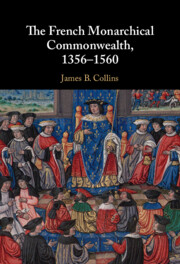Book contents
- The French Monarchical Commonwealth, 1356–1560
- The French Monarchical Commonwealth, 1356–1560
- Copyright page
- Contents
- Illustrations
- Preface
- Introduction
- 1 La chose publique de nostre royaume
- 2 Political Vocabulary in Action
- 3 Murder, Justice, and la chose publique in an Age of Madness
- 4 The Commonwealth under Siege
- 5 The chose publique and Urban Government
- 6 The Orléanist Offensive
- Conclusion
- Bibliography
- Index
2 - Political Vocabulary in Action
Published online by Cambridge University Press: 05 May 2022
- The French Monarchical Commonwealth, 1356–1560
- The French Monarchical Commonwealth, 1356–1560
- Copyright page
- Contents
- Illustrations
- Preface
- Introduction
- 1 La chose publique de nostre royaume
- 2 Political Vocabulary in Action
- 3 Murder, Justice, and la chose publique in an Age of Madness
- 4 The Commonwealth under Siege
- 5 The chose publique and Urban Government
- 6 The Orléanist Offensive
- Conclusion
- Bibliography
- Index
Summary
Having settled on a specific vocabulary for politics, French elites needed to tie that vocabulary to political action. Charles V set out to do so both in practice, through royal edicts and letters, and in theory, by sponsoring the translation of key Classical texts. Oresme’s French translation of Aristotle’s Politics (1373), based on the Latin translation of William of Moerbecke, provided not simply access to this fundamental text, but a glossary of terms, in which he introduced key French neologisms, like “aristocratie.” Theory and practice came together in diplomatic negotiations with the king of England; Charles used Évrard de Trémaugon to justify his position. He simultaneously sponsored the Grandes Chroniques de France, which provided both a written and a visual exposition of the royal French position. These works laid down theoretical justifications for the independent power (puissance absolue) of the king of France. The tax system Charles created gave the king of France permanent financial resources vastly greater than those of any other European ruler, and the new political vocabulary helped to justify action funded by these revenues.
- Type
- Chapter
- Information
- The French Monarchical Commonwealth, 1356–1560 , pp. 73 - 109Publisher: Cambridge University PressPrint publication year: 2022

